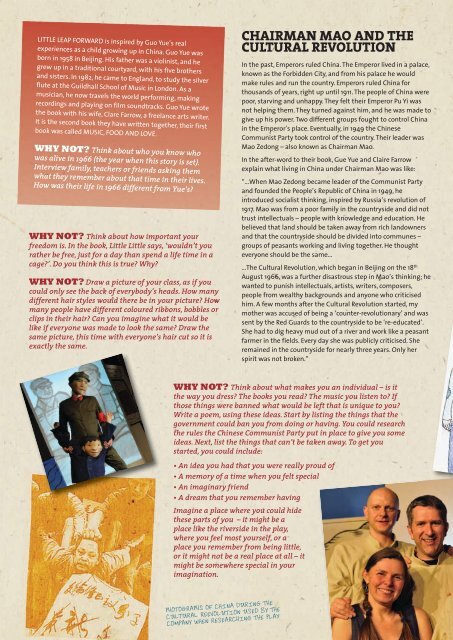LITTLE LEAP FORWARD - Horse + Bamboo Theatre...
LITTLE LEAP FORWARD - Horse + Bamboo Theatre...
LITTLE LEAP FORWARD - Horse + Bamboo Theatre...
Create successful ePaper yourself
Turn your PDF publications into a flip-book with our unique Google optimized e-Paper software.
<strong>LITTLE</strong> <strong>LEAP</strong> <strong>FORWARD</strong> is inspired by Guo Yue’s real<br />
experiences as a child growing up in China. Guo Yue was<br />
born in 1958 in Beijing. His father was a violinist, and he<br />
grew up in a traditional courtyard, with his five brothers<br />
and sisters. In 1982, he came to England, to study the silver<br />
flute at the Guildhall School of Music in London. As a<br />
musician, he now travels the world performing, making<br />
recordings and playing on film soundtracks. Guo Yue wrote<br />
the book with his wife, Clare Farrow, a freelance arts writer.<br />
It is the second book they have written together, their first<br />
book was called MUSIC, FOOD AND LOVE.<br />
WHY NOT? Think about who you know who<br />
was alive in 1966 (the year when this story is set).<br />
Interview family, teachers or friends asking them<br />
what they remember about that time in their lives.<br />
How was their life in 1966 different from Yue’s?<br />
WHY NOT? Think about how important your<br />
freedom is. In the book, Little Little says, ‘wouldn’t you<br />
rather be free, just for a day than spend a life time in a<br />
cage?’. Do you think this is true? Why?<br />
WHY NOT? Draw a picture of your class, as if you<br />
could only see the back of everybody’s heads. How many<br />
different hair styles would there be in your picture? How<br />
many people have different coloured ribbons, bobbles or<br />
clips in their hair? Can you imagine what it would be<br />
like if everyone was made to look the same? Draw the<br />
same picture, this time with everyone’s hair cut so it is<br />
exactly the same.<br />
CHAIRMAN MAO AND THE<br />
CULTURAL REVOLUTION<br />
In the past, Emperors ruled China. The Emperor lived in a palace,<br />
known as the Forbidden City, and from his palace he would<br />
make rules and run the country. Emperors ruled China for<br />
thousands of years, right up until 1911. The people of China were<br />
poor, starving and unhappy. They felt their Emperor Pu Yi was<br />
not helping them. They turned against him, and he was made to<br />
give up his power. Two different groups fought to control China<br />
in the Emperor’s place. Eventually, in 1949 the Chinese<br />
Communist Party took control of the country. Their leader was<br />
Mao Zedong – also known as Chairman Mao.<br />
In the after-word to their book, Gue Yue and Claire Farrow<br />
explain what living in China under Chairman Mao was like:<br />
“…When Mao Zedong became leader of the Communist Party<br />
and founded the People’s Republic of China in 1949, he<br />
introduced socialist thinking, inspired by Russia’s revolution of<br />
1917. Mao was from a poor family in the countryside and did not<br />
trust intellectuals – people with knowledge and education. He<br />
believed that land should be taken away from rich landowners<br />
and that the countryside should be divided into communes –<br />
groups of peasants working and living together. He thought<br />
everyone should be the same…<br />
…The Cultural Revolution, which began in Beijing on the 18 th<br />
August 1966, was a further disastrous step in Mao’s thinking; he<br />
wanted to punish intellectuals, artists, writers, composers,<br />
people from wealthy backgrounds and anyone who criticised<br />
him. A few months after the Cultural Revolution started, my<br />
mother was accused of being a ‘counter-revolutionary’ and was<br />
sent by the Red Guards to the countryside to be ‘re-educated’.<br />
She had to dig heavy mud out of a river and work like a peasant<br />
farmer in the fields. Every day she was publicly criticised. She<br />
remained in the countryside for nearly three years. Only her<br />
spirit was not broken.”<br />
WHY NOT? Think about what makes you an individual – is it<br />
the way you dress? The books you read? The music you listen to? If<br />
those things were banned what would be left that is unique to you?<br />
Write a poem, using these ideas. Start by listing the things that the<br />
government could ban you from doing or having. You could research<br />
the rules the Chinese Communist Party put in place to give you some<br />
ideas. Next, list the things that can’t be taken away. To get you<br />
started, you could include:<br />
• An idea you had that you were really proud of<br />
• A memory of a time when you felt special<br />
• An imaginary friend<br />
• A dream that you remember having<br />
Imagine a place where you could hide<br />
these parts of you – it might be a<br />
place like the riverside in the play,<br />
where you feel most yourself, or a<br />
place you remember from being little,<br />
or it might not be a real place at all – it<br />
might be somewhere special in your<br />
imagination.<br />
PHOTOGRAPHS OF CHINA DURING THE<br />
CULTURAL REEVOLUTION USED BY THE<br />
COMPANY WHEN RESEARCHING THE PLAY


